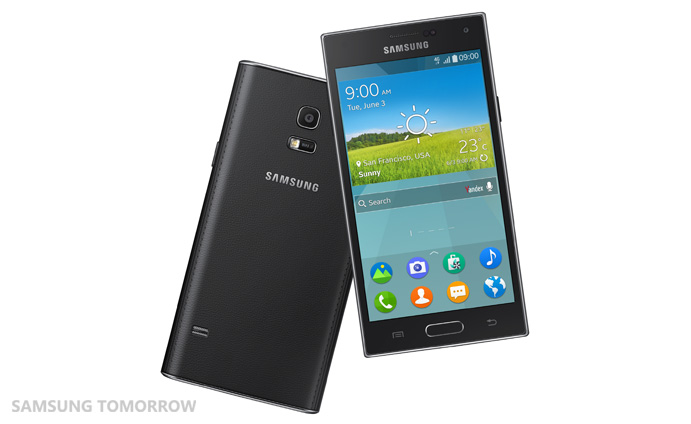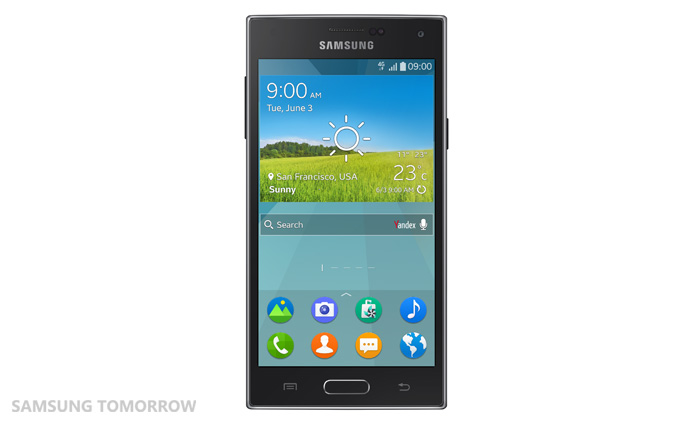Samsung Ditches Android With Its Samsung Z For Tizen OS
Samsung is now living the dream: It has built a smartphone that it can lard up with as much bloatware as it likes and there’s nothing Google can do about it.
On Monday, Samsung took the wraps off the Samsung Z, its first-ever smartphone that runs on its own native Tizen platform, instead of Google’s Android OS
The new device features a 4.8-inch Super AMOLED display, a 2.3GHz quad-core processor, an 8-megapixel rear-facing camera, a 2.1-megapixel front-facing camera, a fingerprint scanner, 2GB of RAM, 16GB of storage, a 2600mAh battery and Tizen 2.2.1, making it a novel beast indeed.
The launch means that consumers now have more choice of mobile phone software beyond the dominant Google Android and Apple iOS operating systems
The Samsung Z device will now compete directly with smartphones running Android and Microsoft’s Windows Phone, employing the Tizen software that will be incompatible with Android applications and Samsung’s Galaxy smartphones.
“Samsung is committed to enhancing the mobile experience of consumers with innovation that is both personal and unique to their needs,” DJ Lee, president of global sales and marketing for Samsung noted in a blog post.
“The Samsung Z integrates the power and adaptability of the Tizen platform, enabling users to browse the web faster and utilise applications more effectively.”
Samsung first started using Tizen this year with its Gear 2 smartwatch and it’s an OS that the company has designed to lessen its dependence on Android and give it control of its own mobile ecosystem
Samsung’s flagship Galaxy S and Galaxy Note lines of phones will continue using Android as their platforms for the foreseeable future but the company doesn’t see any harm in popping out a few Tizen phones each year to see if there’s any demand for them.
The Z will include access to a Tizen app store, which means buyers can expect a few thousand native apps. However the OpenMobile application compatibility layer will enable the handset to run Android apps too.
Samsung will release the Samsung Z in Russia sometime in the third quarter this year and will gradually expand its availability in other markets later. No pricing information for the device has yet been announced, but we imagine Samsung will sell it for less than it sells the Galaxy S5 and the Galaxy Note 3.
Samsung’s Tizen software is similar to Android and based on the Linux open source software, but is controlled by companies including Samsung and Intel
It is not compatible with Android and its applications. Android development is driven by Google with the Android Open Source Project and the Open Handset Alliance, of which Samsung is also a member.
Tizen affords Samsung more control over its software and avoids the need to include Google's software, search and applications such as Gmail, Google Maps and Google+. It also allows Samsung reduce its dependence on Google, something the company has tried in the past with its own Bada smartphone software, which eventually became part of Tizen.
What does it mean to consumers?
“The launch of Tizen on Samsung handsets provides an exciting proposition for emerging market consumers, where accessibility to truly localised content and appropriate payment mechanics could at last become a reality,” said Marco Veremis, chief executive of mobile marketing specialists Upstream.
Others are not quite as enamoured with the prospect of yet another mobile software platform. “What does it mean to consumers? Nothing. No additional value to make the switch from Android worth it,” said Francisco Jeronimo, research director at firm IDC.
The Samsung Z follows the introduction of the Tizen-powered Gear 2 smartwatch, which replaced the originally Android-powered Galaxy Gear smartwatch from 2013. Samsung recently issued a software update that replaced Android with Tizen software on the Galaxy Gear, removing Android from all of Samsung’s smart wearable devices.


